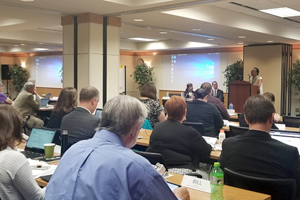
AACRAO’s 2019 Fall Symposium began with an examination of UNESCO’s Global Recognition Convention by US international admissions officers and international credential evaluators as an exercise in comparative analysis. The Fall Symposium aimed at not only an examination, discussion, and debate of the tenets of the Global Recognition Convention, but to raise awareness of it in the United States. The Global Recognition Convention was broken down into smaller segments for analysis at the Fall Symposium. Since the Symposium, AACRAO has continued the discussion via AACRAO’s e-newsletter Connect, webinars, conference presentations, and a variety of media.
Colleagues involved in this effort provided guidance and self-diagnostic tools to AACRAO members to aid in assessing the use of best practices in policies and procedures for evaluating, admitting, and placing international students.
Outcomes and Accountability
Generate a self-diagnostic tool (“Self Audit”)for U.S. higher education institutions to use to compare and contrast their policies and practices with that of the Global Convention to determine if they are adhering to the generally-accepted best practices that govern international admissions and credential evaluation and align with the GRC. Generate a set of guiding principles for the development of institutional policy and adherence to best practices in the field of international admissions and credential evaluation.
Executive Summary
UNESCO's Global Convention of Recognition (GCR) of Qualifications concerning Higher Education was the focus of AACRAO's 2019 Fall Symposium. While the GCR is not binding, this convention, when ratified, will help grow interregional student mobility, provide for the transparent and fair recognition of qualifications, enhance the quality of higher education, and bring coherence to disparate recognition processes.
Attendees at the AACRAO 2019 Fall Symposium debated what and whether the U.S. international admissions and credential evaluation community could learn from the Global Convention on Recognition. Their discussions closely mirrored the discussions that took place at UNESCO meetings in Paris in December of 2018. AACRAO’s Fall Symposium attendees found that the work of U.S. international education professionals aligned well with the principles of the Global Convention on Recognition, particularly in the area of recognizing partial studies. In fact, AACRAO's 1997 International Student Bill of Rights can be viewed as a forerunner to the Global Recognition Convention.
Since the U.S. does not have a central authority for educational credential recognition, it is the community's responsibility to evaluate the Global Recognition Convention and to see how it can be used to advance students' educational goals. Credential recognition is essential for strengthening the competitiveness of the U.S. higher education system, as well as for serving learners. Looking ahead, associations such as AACRAO and TAICEP -- the Association for International Credential Evaluation Professionals -- are expected to play a central role in representing American institutions and their views with regard to credential evaluation.
Background
The conversation about recognition of higher education credentials has evolved in recent years, due in part to increased student mobility. At the time of the AACRAO 2019 Fall Symposium, the 193 member countries of UNESCO were finalizing a Global Convention on the Recognition of Higher Education Qualifications.
Historically the United States has been unwilling and found it unnecessary to sign agreements like UNESCO's Global Convention on Recognition, preferring instead to retain its autonomy in decision-making about educational equivalencies. Yet AACRAO maintains that many of the tenets of the Global Convention on Recognition align with best practices and procedures in U.S. international credential evaluation.
The U.S. higher education sector must consider how adopting the principles of the UNESCO Global Convention on Recognition could affect its work and its competitiveness as a study destination, and decide whether it wants to adopt a different approach than in the past.
Stay Informed
Visit AACRAO's Signature Initiative page on Global Recognition and join the list to receive updates.